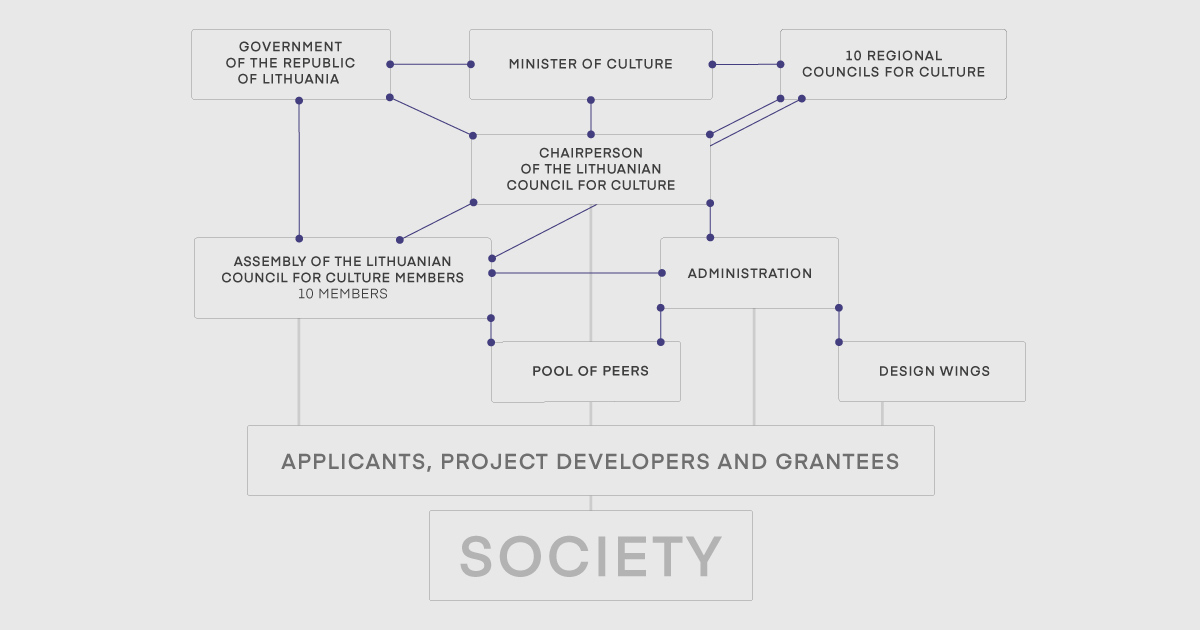STATUS OF THE INSTITUTION
The Lithuanian Council for Culture is a budgetary institution under the Ministry of Culture of the Republic of Lithuania, which implements the state policy in the areas of management entrusted to the Minister of Culture, and carries out public administration, cultural research and other functions defined in the Law on the Lithuanian Council for Culture. The Lithuanian Council for Culture was established in 2013 to reform and democratise cultural governance and develop cultural self-regulation.
GOAL
The Lithuanian Council for Culture competitively selects and allocates funding for applications from organisations and grants to creators, investing public funds in the public welfare, creative self-expression, artistic development, diversity of cultural practices, and dissemination in Lithuania and abroad. The institution manages and monitors the funded projects and carries out large-scale cultural research with various partners.
THE ARM'S LENGTH PRINCIPLE
The Council is founded following the arm's length principle, which operates in many liberal democracies, to ensure a funding allocation process that is independent of political influence, preference or censorship. Autonomous funding decisions made by elected professionals in the cultural community through representative democracy create the conditions for a natural self-regulation of artistic processes, support freedom of expression, diversity and critique.
FUNDING MECHANISM
Funding decisions are made by professionals in art and other cultural areas, according to thw arm's length principle. The pool of peers of the Lithuanian Council for Culture, after evaluating the applications, rank them according to their scores with comments, and make various recommendations for funding to the Assembly of the Council Members, who make final decisions. As the rotating panels of the pool of peers only evaluate proposals in a specific field or programme, and the Council members decide on the overall scope of the proposals with the benefit of additional information and an appreciation of the overall context, the decisions they make may differ from the pool of peers' proposals. The pool of peers of the Lithuanian Council for Culture are selected for a 2-year term of office by the Assembly of the Council Members through a public competition.
FUNDING GUIDELINES
The Guidelines for the Submission of Projects Funded by the Lithuanian Council for Culture and the Description of the Procedures for the Award of Grants to Creators of Culture and Art are the main rules for the submission of applications, evaluation and implementation of the projects, which, together with the annexes, make up a document of about 100 pages. The document is revised annually and many parties are involved in this process. Suggestions for the Guidelines are made by the Assembly of the Council Members and the administration, after taking into account the observations of the cultural community. The recommendations are presented to the policy team of the Ministry of Culture and to the Lithuanian Council for Culture and Art, and the guidelines are approved by the Minister of Culture.
BOARD MEMBERS OF LITHUANIAN COUNCIL FOR CULTURE
The Lithuanian Council for Culture is comprised of 10 professionals representing different fields of art and other cultural areas, elected by the cultural community for a four-year term and approved by the Government on the nomination of the Minister of Culture. The Board Members of the Council and the institution are led by a Chairperson, who is appointed by the Government, on the nomination of the Minister of Culture, to this position as a civil servant.
STRUCTURE OF LITHUANIAN COUNCIL FOR CULTURE
The activities of the Lithuanian Council for Culture have many links with various institutions and groups of individuals that interact with each other. In accordance with its competences and powers set out in the Law, decisions are made by Board Members of the Council together with the Chairperson, supported by a large pool of peers and the administration, which ensures the smooth running of the entire funding process and constant communication with applicants, project developers and grant holders. Their creative content, cultural services and experiences create benefits for society and contribute to the welfare of the country.
Since 2018, the Lithuanian Council for Culture model includes Regional Councils for Culture, which evaluate the applications for Balanced Regional Growth and develop funding priorities. Their work is managed by the Council, but their membership is approved by the Minister of Culture. And since 2022, the Design Wings project has been running within the Lithuanian Council for Culture structure.
IMPACT OF LITHUANIAN COUNCIL FOR CULTURE
The Lithuanian Council for Culture has allocated more than 200 million euro for the period 2014–2023. The Lithuanian Council for Culture has received over 70,000 applications and funded nearly 26,000 ideas through its public tender mechanism. The Lithuanian Council for Culture has funded a total of 18,500 projects and awarded 7,500 grants over the past 10 years.
CULTURAL RESEARCH
The Division of Monitoring and Analysis (DMA) was set up in 2017 to monitor cultural and artistic processes, build databases, and perform data modelling and analysis. DMA also carries out research in the field of culture and art, assessments and studies of Lithuanian Council for Culture programmes in accordance with the Council's research plan approved by the Minister of Culture of the Republic of Lithuania, and makes recommendations for the improvement of the cultural policy model. In the period 2017–2023, 39 research studies were completed by DMA.

